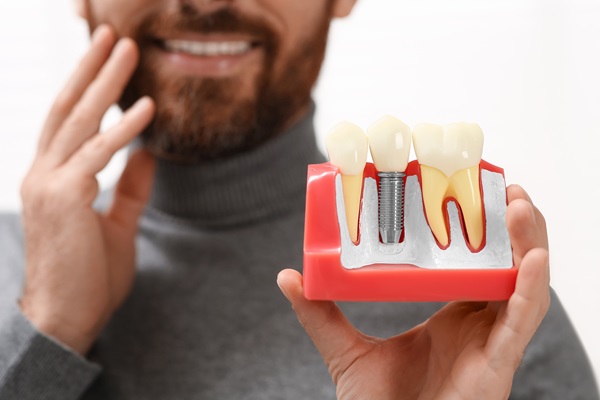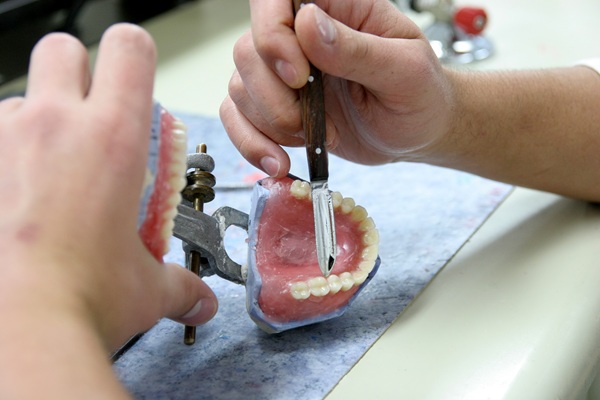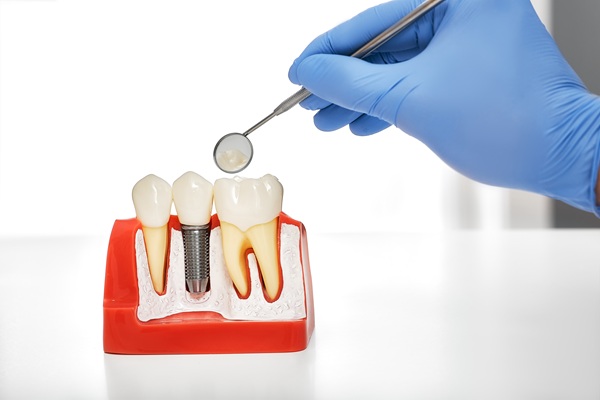Can Dental Implants Support a Dental Bridge?

Looking for information on dental implants? If you have suffered significant tooth loss, but not enough to need a complete arch replacement, you can get a dental bridge supported by dental implants. Implant-supported bridges can provide a reliable, functional, and long-term solution to tooth loss. Unlike traditional bridges or removable partial dentures, a dental implant-supported bridge will not need the support of the surrounding healthy teeth.
How do bridges supported by dental implants work?
In a traditional dental bridge, existing teeth on the sides of the missing tooth are filed down and covered with dental crowns that will support the new false tooth. This means that there had to be healthy teeth on the jaw to hold the bridge. It has been used for decades for replacing a lost tooth. Bridges are usually created from porcelain, so they are customizable to match the remaining teeth.
With implant-supported bridges, dental implants are inserted into the jaw, providing a solid anchor as the bone and the titanium post fuse together. A bridgework of false teeth is fabricated to match the shape, size, and color of the existing teeth. The bridge is then attached to the implant.
After the implants are placed, patients will need to keep up with dental checkups to ensure the bone is healing correctly. The success of the procedure depends on the osseointegration process. Using dental implants to support a dental bridge makes it more stable and functional.
The benefit of implant-supported dental bridges
Implant-supported dental bridges do not require natural teeth. Each end of the bridge is anchored to a single dental implant. They are suitable in cases of multiple missing teeth. They make it possible to replace more teeth than a conventional bridge. As many as three to five teeth can be restored at one time. Implants are incredibly strong and can handle more weight than a regular tooth.
Regular bridges weaken eventually. Decay can occur around the supporting teeth. Bone loss can compromise their fitting. Most traditional bridges need to be replaced every decade or so. In a few decades, patients may end up paying for two or three dental bridges.
The constant repair and refitting of bridges cause the deterioration of the supporting teeth. Eventually, there may not be enough enamel to perform the process. If issues occur with only one tooth, it may be difficult for the other healthy tooth to provide support to the bridge adequately. Therefore, there are more risks with traditional bridges than using implants to support a bridge.
An implant-supported bridge lasts longer than regular bridges. The tooth restoration can last a lifetime with proper care and maintenance. Even if the bridgework deteriorates, the implants underneath will not need to be replaced or refitted. Implants are considered the most durable tooth replacement option available. Once the bone fuses with them, the implants are secure and help to improve bone quality.
Are you considering getting dental implants?
Tooth replacement with a dental bridge supported by dental implants can help to maintain the natural alignment of the teeth. To know whether you are eligible for this option, book an appointment with an experienced dentist. The sooner the replacement is done, the better.
Request an appointment here: https://www.georgetown-dental.com or call Georgetown Dental Partners at (978) 867-0860 for an appointment in our Georgetown office.
Check out what others are saying about our dental services on Yelp: Dental Implants in Georgetown, MA.
Recent Posts
Many dental professionals recommend dental implants restoration after tooth loss. Dental implants offer superior durability and functionality and look just the same as natural teeth. However, some patients are nervous about the success rate of dental implant restoration, and learning more about what the stats say can help you physically and mentally prepare yourself. According to…
Getting dental implants can be both exciting and scary for many people. The scary part of it all is the unknown, not understanding the process. Once they learn what is expected, many are surprised at how straightforward the process is from start to finish. One of the biggest questions that many people have is aftercare…
Those with one or more missing teeth can choose between tooth replacement options like a dental implants, a traditional bridge, or dentures. Bridges and dentures used to be the norm, but they are not suitable for everyone. Due to reasons like soreness, discomfort, and poor fit, you may need to consider a different tooth replacement…
Dental implants and bridges are two options you get to explore if you have missing teeth. These oral restorations restore the function and appearance of missing teeth in their unique way. Missing teeth can reduce one's confidence. Not replacing lost teeth can also cause the remaining teeth moving out of their proper alignment. This can…


